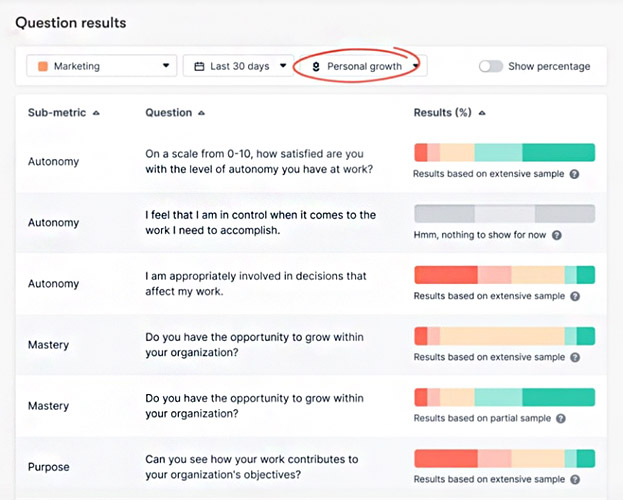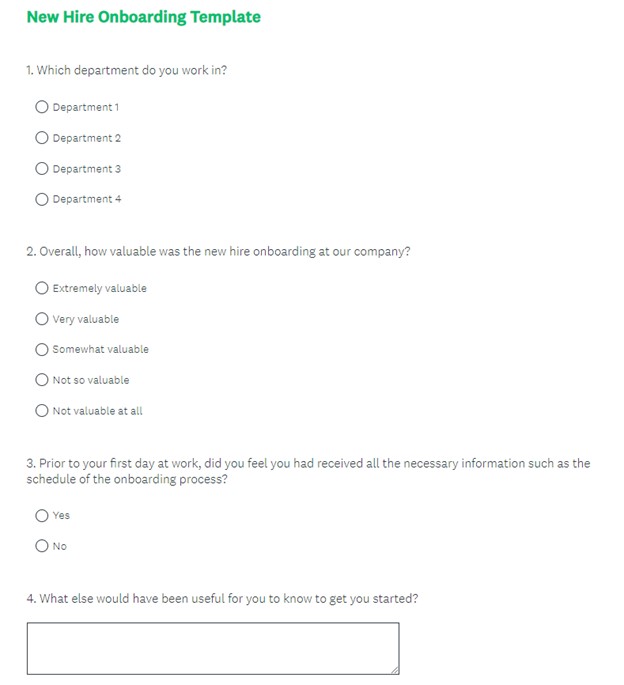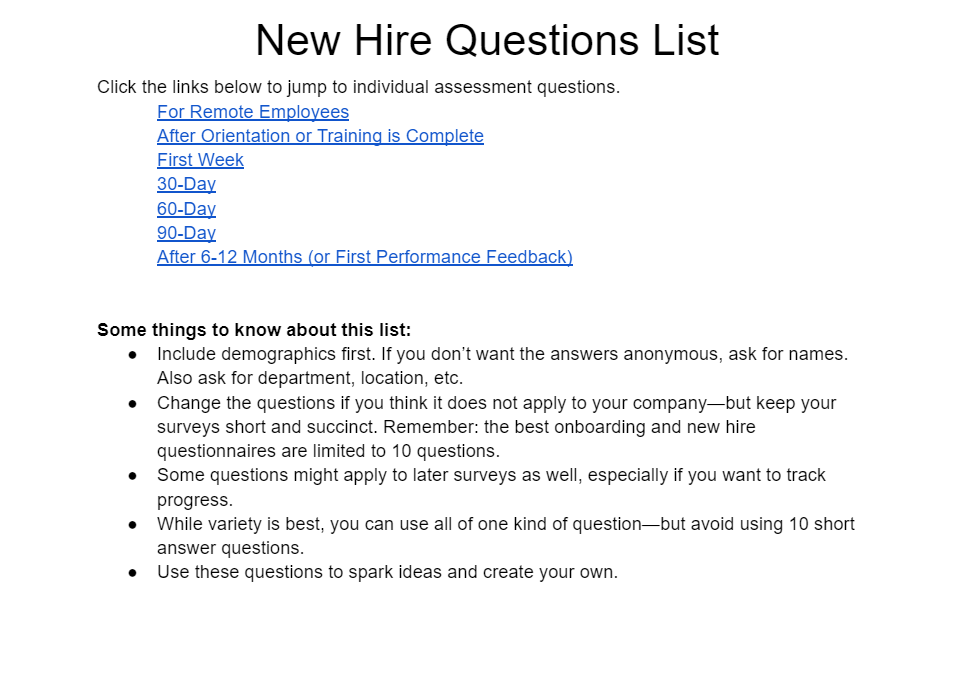The first few months of a new hire’s tenure set the stage for the rest of their time in your company. Onboarding and new hire surveys help you ensure that they are getting the training and support they need and feel not just welcomed, but a part of your brand. We cover new hire survey questions, when to conduct an onboarding survey, and the best practices for successful new employee surveys.
When Best to Send Out New Hire Employee Surveys
You should get a pulse check on your new employee several times during their first few months on the job, especially after important milestones are reached, such as completing onboarding, finishing initial training, and before or during their first performance report. This helps you keep track of how your new hire is adjusting and growing into part of your team.
Each new hire survey should be geared toward where they are in the employee cycle. Below, we give 10 examples of the most common new hire experience survey questions by timing. These are listed as general questions and you should reword them for variety.
Alternatively, you can download the template we provided above. We provide 10 questions for each phase using a variety of question styles to get the best information. Use them as-is or let them inspire you to questions that apply more specifically to your company.
New Hire Survey After Orientation
You should give this questionnaire to your new hire immediately upon completion of their orientation or initial training, while their impressions of the experience are fresh in their minds. The purpose is to evaluate how effective your program is for their situation.
This survey can reveal any holes in training that you can fix right away by getting the new hire the information they need and by making changes to the orientation or training so that future employees don’t have the same problems. It can also help you identify areas where your employee may simply need a little more attention than average.
- How prepared do you feel for your work?
- How integrated do you feel into your team?
- How satisfied are you with the onboarding/training?
- How satisfied are you with the resources provided during onboarding/training?
- How clear are the orientation/training documents?
- Do you understand the company’s values and culture?
- If you could revise the orientation/training, what would you change?
- What did you like most about orientation?
- What did you like least?
- Can you describe any challenges you faced during the onboarding process?
First Week Onboarding Survey
These onboarding survey questions for new hires check how well your new hire was onboarded and how they feel about the job and company. By asking them within the first week, you get their first impressions, which can be the lasting ones.
Use this information to head off any potential problems early on, like a misunderstanding about their duties or confusion about company procedures. It’s also a good time to find out what they are enjoying the most in order to find ways to capitalize on that energy in the future.
- How well did the job description match what your actual job is?
- Why did you decide to join our company?
- What were you doing before you began working here?
- Did you find the orientation program interesting and interactive?
- What aspect of your new job excites you?
- Name one thing about your new job that stands out for you.
- Name one thing that could’ve made your first day at work better.
- Is anything about your role unclear? If so, what?
- Do you understand the company policies?
- Did you feel welcomed by the company?
You may not want to use all the 30- 60- 90-day surveys. You may find they overwhelm your new hire or that the particular job needs more or less time to get acclimated. Alternatively, you may decide not to give a survey to an employee who has adapted quickly. Some of these may be accomplished with a feedback session rather than a formal survey. Use your best judgment.
30-Day New Hire Experience Survey Questions
The goal of this survey is to ensure they are getting comfortable in their role and to see how expectations are meeting reality. A month is usually a good time for a new employee to get settled into the environment and through their initial on-the-job training, while still being new enough to have fresh impressions.
Use this survey to ensure your employee has what they need to develop in their primary duties and is feeling comfortable with the workplace. Since around 17% of new hires leave within the first three months, this survey can catch red flags early on—hopefully allowing you to prevent issues that will lead to their resignation.
- Has your training been relevant to your job responsibilities?
- Do you understand what is expected of you in your role?
- Is there anything you wish you’d known earlier that you know now about this job or your tasks?
- Do you have the knowledge, training, and tools you need to succeed?
- How well has your experience with the organization matched your expectations?
- Do you have the tools and resources you need to perform your job effectively?
- Have there been times when you felt you were left without direction or clear instructions?
- How productive are you on a regular shift?
- How good is your work/life balance?
- What is the one thing you would like to change from your experience so far?
60-Day New Employee Survey Questions
These new hire experience survey questions focus on knowledge transfer and engagement. By two months, they should be developing work relationships with their manager and co-workers and settling into a routine. They’ll have made and met some early goals for their jobs as well.
Use this survey to make sure your new hire is getting the support they need to succeed and to identify any problem areas that could be seeds to a bad attitude about work in the future.
- Do you receive regular, helpful feedback from the manager?
- How comfortable are you with reaching out to coworkers when needed?
- Do you feel motivated to come to work in the morning?
- What policies confuse you or make you uncomfortable?
- How well do you connect and collaborate with all your team members?
- What one thing would you change about how your team works currently?
- Have you met your goals or expectations for your first 60 days?
- How has your journey been so far?
- What has been your biggest accomplishment in 60 days?
- What goals would you like to meet in the next 30 days?
90-Day New Employee Survey Questions
The new hire survey questions at this stage primarily concern manager engagement, role clarity, and how likely they will remain with the company. By now, your employee should be integrated into their team and familiar with their duties enough that they are looking toward a future with the company.
Use this survey to gauge how well your employee has settled into their role and how they feel about their immediate future with the company. Check that relationships with co-workers and managers are continuing to develop in a positive way.
- I see myself still working here two years from now.
- What other training or career development do you wish you could get?
- Is your manager helping you to succeed in your career as well as your immediate tasks?
- Does your manager routinely meet with you to discuss your responsibilities, tasks, and performance?
- What would you like to be doing at this company or in your role over the next year?
- How do you see yourself progressing at our company?
- Would you recommend the company to others in your network?
- How much do you believe in the vision and mission of the organization?
- Do you believe your ideas are valued by your manager and/or co-workers?
- Are your roles and duties clear?
6- to 12-Month New Hire Survey Questions
Here, you are looking for long-term satisfaction and goals. Between six and 12 months, your employee should be completely trained and experienced in their job, maybe even to the point of teaching others. They should feel like an integral part of their team and the company and are starting to have thoughts about their future.
Thus, use this survey to make sure they are well-integrated into the company culture as well as their specific role. Feel out any concerns they have about their future with the company as well as what ambitions they have for the future.
- Are you able to achieve work-life balance well?
- Do you feel that you can depend on other members of your team?
- Has communication with necessary personnel been effective in getting the job done?
- Does your immediate manager care about your career development?
- Does your direct manager care about you as a person?
- Are the goals and accountabilities clear for everyone on the team?
- Do you understand the organization’s plan for the future?
- Do you believe in the organization’s future success?
- What do you need to further your career in the company?
- If you were CEO for a day, what change would you make in the company?
Remote Employee Questions
Remote employees face different challenges than those in the office. Thus, you may want to consider adding some of these questions to their onboarding surveys. These surveys give your remote employees a chance to speak up when they may not feel they have an opportunity otherwise.
Use these surveys to make sure your remote employees have the tools they need, whether clear instructions or the right software, and that they are comfortable reaching out when they need help.
- Do you have all the tools you need to handle your role?
- How satisfied are you with the communication and support provided during the remote onboarding process?
- How well can you communicate with your team members remotely?
- How well were you trained on any remote-specific tools and processes?
- What could help you stay better connected to the rest of your team?
- Have you had any communication issues that need to be addressed?
- Do you have access to all the information you need?
- What’s one thing you would change about our current workflow?
- How satisfied are you with the support provided?
- How well were you able to understand the company’s culture and values remotely?
Best Practices for New Employee Survey Questions
Before we start listing questions themselves, let’s discuss a few best practices. Overall, you want to make your survey something that your new hire wants to fill out, fully and honestly. That means you should make it brief, specific, and non-threatening so that they are comfortable bringing up problem areas.
- Know your goal: Each new hire onboarding survey should have a specific goal. We note general goals in each section of questions, but you can narrow it to focus on specific suspected issues or your company dynamic. Share the goal with the employee, but be careful not to lead them in their answers.
- Make them short and convenient: Best practices say to keep your onboarding survey questions to 10 or fewer per survey. Your employee should be able to complete it quickly and on company time.
- Vary question types: Only a few of the questions should be short answers. The rest should include scale questions (“On a scale of 1-10, how would you rate…”) or Likert questions (strongly agree, agree, neutral, disagree, strongly disagree.) You can also ask Yes/No questions, multiple choice, rank-order, or other kinds of questions.
- Word it carefully: Word open-ended questions in a way that sparks thought rather than a Yes/No answer. Also, keep the wording non-inflammatory and impersonal. For example, instead of asking if they found something wrong, ask, “What changes would you make?”
- Use the easiest distribution system for the employee: Survey software makes it easy to design, take, and analyze surveys—check out our recommended survey software guide for options—but you can use other methods, even paper. In an office, an email with a link to the survey might make the best sense. Hourly workers may respond better to a reminder in their time clock software. Remote employees might prefer Slack.
- Send reminders: The best employees are busy doing their jobs, so expect that they may put the survey aside and forget. A gentle reminder (or even the promise of a reward) will encourage them to get it done.
- Analyze results and follow through: A new hire onboarding survey is no good unless the information gets used. Address issues, especially those that can be easily solved for the new hire (like inadequate training). Track trends and look for long-term resolutions. And note the good things, too, giving credit to the manager or trainer who does an excellent job.

Survey software like Workleap, shown here, can help you analyze results to uncover trends. (Source: Workleap)
Why Use an Onboarding Survey for New Hire Survey
The turnover rate for employees is going down; however, it’s still over 17%, according to the US Mercer Turnover Survey. A significant percentage of those happen in the first three months. The average cost for hiring a new employee is $4,700, but can be as much as four times the position’s salary—a huge investment for only a few months’ work!
Employees leave quickly when they discover the job is a bad fit or feel they don’t have the tools or support to do the job they were hired to do. Onboarding feedback surveys and subsequent new employee surveys can help you gauge employee satisfaction with their new job, uncover problem areas (like inadequate training), and detect trends that can help you with hiring practices, onboarding, or even company culture.
In short, using onboarding surveys to help improve the experience can result in:
- Increased employee retention
- Decreased need to hire and train new employees
- Greater employee referrals
- More engaged employees
- Improved performance

New hire survey questions, like these from SurveyMonkey, help you gauge employee satisfaction and readiness for work. (Source: SurveyMonkey template)
New Hire Survey Frequently Asked Questions (FAQs)
An onboarding survey for new hires is a group of questions that rates your new employee’s experience at a particular stage in their employment. The questions usually concern how well company programs like orientation or training prepare the employee for their job, how well they are fitting in, and whether their work expectations are being met.
You should ask a variety of questions to rate how well your onboarding and training programs are working, how well prepared the employee feels for their job, and how satisfied they are with their employment. These ultimately help you view your onboarding and training process to see where improvements can be made.
Good new hire onboarding survey questions have a variety (like ratings or short answers), focus on gauging employee wellness as well as program efficiencies, and make the new hire feel like their opinion is truly desired and appreciated. These should also provide you with actionable data for improving your processes.
Onboarding survey questions for new hires that follow the 1 to 10 scale are qualitative and opinion-focused. These generally deal with satisfaction and commonly start with the phrase “How well” or “How effective.”
HR managers agree that a good onboarding survey helps with employee retention. It identifies strengths and weaknesses, provides a way to open communication with a new employee, and forges a relationship of trust.
An onboarding survey is no good unless you use the data. You should have already considered the key metrics you are tracking, so analyze the data for any patterns that may indicate overarching problems that you can solve with a new policy, training, or even software. Also, look for strengths you can enhance. Data may reveal that new hires have priorities that you are not addressing or that you are over-emphasizing some aspects of orientation.
On a personal level, if there are issues brought up that concern a specific employee or manager, you can act upon them. You can also use the surveys (if they are not anonymous) to track the progress your new hire makes in settling into their job and the company culture.
Bottom Line
New hire survey questions help you understand the strengths and weaknesses of your onboarding and training and gauge how well your new hire is fitting into their new job, new team, and your company. You should have several surveys throughout their first few months or when milestones hit. The 60 we provide are just a few of the many new hire experience questions you can ask; check out our download for more and don’t be afraid to create questions that suit your specific situations.
